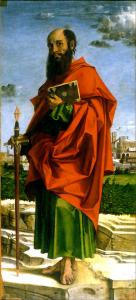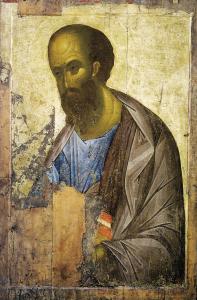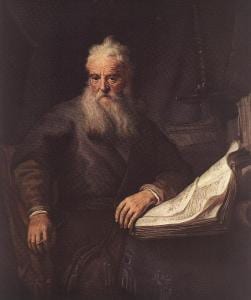 After Luke’s famous tale of Paul’s work in Athens, the center of ancient Greek learning, where Paul supposedly discusses with the Athenian philosophers the status of their “unknown god,” the apostle continues on his missionary journey to the port city of Corinth. Each time I have visited the city of Athens, I have of course gone to the Areopagus, Mars Hill, a spot marked for tourists by many signs in several languages telling us “Paul preached here.” I admit to being suspicious of the historicity of this event; the Paul of Acts 17 sounds so very different than anything we find in the rest of Acts and certainly different from Paul’s language in his authentic letters, among which there is no Athenian correspondence. Paul certainly founded no church in Athens, and if ever he was actually there, his influence on the city and its inhabitants was apparently next to nothing. But his work in Corinth was significantly different from and much more successful than, his supposed time in Athens.
After Luke’s famous tale of Paul’s work in Athens, the center of ancient Greek learning, where Paul supposedly discusses with the Athenian philosophers the status of their “unknown god,” the apostle continues on his missionary journey to the port city of Corinth. Each time I have visited the city of Athens, I have of course gone to the Areopagus, Mars Hill, a spot marked for tourists by many signs in several languages telling us “Paul preached here.” I admit to being suspicious of the historicity of this event; the Paul of Acts 17 sounds so very different than anything we find in the rest of Acts and certainly different from Paul’s language in his authentic letters, among which there is no Athenian correspondence. Paul certainly founded no church in Athens, and if ever he was actually there, his influence on the city and its inhabitants was apparently next to nothing. But his work in Corinth was significantly different from and much more successful than, his supposed time in Athens.
When Paul arrived in Corinth sometime after 50 CE, the city was one of the greatest of the Roman Empire, rivaling in size even Rome itself. The conquering Romans first destroyed the city in 146BCE as they swept east to establish their enlarging domain, but Julius Caesar founded the Roman colony in 44BCE, and substantially rebuilt the place in 27BCE, making it the capital of the province of Achaia, where the proconsul Gallio had his residence (Acts 18:12). The archaeological evidence left to us in Corinth is rich and unusually significant. We know as much about Corinth as we do any city of the Empire.
As a port city, Corinth was a busy center of trade and commerce, with an enormous permanent and transient population. And as in all port cities, ancient and modern, sailors from every country of the world made anchor at Corinth and soon spent their money and their time among the market stalls and bordellos that dotted the streets and alleys of the metropolis. These businesses soon gave Corinth a wide reputation as a place of easy vice, a place where a fool and his money were soon separated one from the other. Of course, Corinth’s reputation for sexual pleasures had been well known for hundreds of years. As early as the dramatist Aristophanes (450-388BCE), Corinthian was a by-word for sexual gratification; he coined a term korinthiazesthai that meant “to fornicate.” And two other playwrights, Philetaerus and Poliochus, later in the fourth century BCE, wrote plays with the title Korinthiastes, or “The Whoremonger.” Thus, when Paul arrived there, all those years later, he found a city filled with all the attractions and dangers of any port city of the Roman world.
In addition to the pleasurable possibilities, one could find every sort of religious tradition imaginable, and some rather new in the world. There was, of course, a “Synagogue of the Hebrews,” ubiquitous in the larger cities of the Empire, a large temple to Apollo, some of whose columns stand even today, a shrine to the goddess Isis, of ancient Egyptian renown, along with an infamous temple to Aphrodite (goddess of love), high on the Acrocorinth, the large rock outcrop that dominates the city. Both Strabo (63BCE-24CE) and Pausanias (110-180CE) describe this Aphrodite temple in lurid detail, though clearly both wildly exaggerated its supposed contingents of 1000 sacred prostitutes. Nevertheless, a wandering seaman could find both diversions of the flesh of every sort and time for religious devotions as well. In the case of the Aphrodite temple, perhaps both sexual and religious urges could be fulfilled with one stop! Into this bustling city, Paul brought his gospel of Jesus Messiah to add to the wild diversity of thought endemic to the place.
Apparently, soon after his arrival, he met a missionary couple, Priscilla and Aquila, both Jews, the former a native of Pontus, a city on the southern seaboard of the Black Sea. The couple “had recently arrived from Italy because Claudius had ordered all Jews to leave Rome” (Acts 18:2). This couple is always in the New Testament mentioned together (Acts 18:18, 26; Rom.16:3), and both are viewed as Christian missionaries equally, suggesting the possible egalitarian nature of the very earliest communities of Christian believers. Also, this tiny note in 18:2 is an important one for the dating of Paul’s ministry. If Priscilla and Aquila were forcibly removed from Rome by Emperor Claudius, we know from the Roman historian Seutonius (ca.69-126CE) in his Life of Claudius that the expulsion edict was issued in 49CE. Hence, that places Paul in Corinth sometime after that date. Furthermore, Priscilla and Aquila were the apparent founders of the church of Rome, where Paul will end his ministry around 66CE.
Just as Priscilla and Aquila worked with leather, so too did Paul, so they set up shop in the marketplace of Corinth to ply their very important trade. The Greek word used literally does mean “tentmaker,” and given the transient nature of the population of Corinth, many coming from the sea but headed to any number of landlocked places, tent making would be a crucial business. It may also be that the word implies a more generalized worker in leather, perhaps sewing belts, hats, whips, sails, etc. One can imagine a lively trade growing up around Paul and his new found friends, as he remained in Corinth for 18 months. While in the city, working in the market, striking up conversation with clients for his important skills, no doubt Paul never missed a chance to discuss with them his devotion to Jesus Messiah and to urge them to join him in the expanding community of Christianity.
For certain, as always, Paul “engaged in debate every Sabbath in the Synagogue” (Acts 18:4). The verb translated “engaged in debate,” from where our English word “dialogue” derives, is a technical term meaning scholastic dispute within the synagogue, that is the beth ha midrash or house of study. Paul was among many other things a zealot for the word of Jesus, and debated vigorously with those masters of the Torah of Judaism in the attempt to convince them that Jesus was their and his long-awaited Messiah. But, again, as we have witnessed in several other stories in Acts, though some Jews were convinced, including here the “ruler of the synagogue, Crispus,” many Jews “opposed him and spoke harshly” (Acts 18:6); Luke here uses a word that can also be translated “blasphemed.” Surely, to the faithful followers of Judaism, what Paul was teaching was nothing less than blasphemy.
As I read this small account of the founding of the Corinthian church, a church to which Paul will write two of his most revered letters, letters filled with dismay at their divisions (1 Cor.1), yet also containing some of the apostle’s most glorious words (1 Cor.13), I am reminded of the astonishing ministry of this single man, said by many who heard him to be a poor speaker, filled with angry and cruel linguistic assaults against those who did not agree (see Gal.5, for example), yet afire with the conviction that all needed to hear of the love and grace of the man Jesus, who, though crucified, was alive in his heart forever. For all of his faults, this man Paul brought news of Jesus Messiah literally to the known world, suffering all manner of pains, shipwrecks, and violent rejection, yet persisted in his work of preaching in the face of it all. Though on occasion, we are told that he spoke to large crowds, in reality I doubt that. I imagine his audiences were always small and filled with many who puzzled at his words, many who wanted him to clarify what he said, and many who found him slightly insane and said so. Paul taught me that the true power of the gospel is never in tune with the current of the time, but always represents an upside down way of viewing the world; his world and ours lusts for power and wealth and success and fame, while his Jesus rejected all that for the sake of love and commitment to the least and the lost.
I doubt I would have enjoyed being around Paul, so fixed was he on his gospel task, so single-minded was his focus on Jesus Messiah that there was little time for chat or playful fun. But surely it can be said that without him the Christian movement could well have died and become just another first-century cult along with those of Isis or Aphrodite. We owe much to this difficult and irascible man who continues to speak even now whether we live in New York or LA or wherever a modern Corinth may be found.
(Images from Wikimedia Commons)











